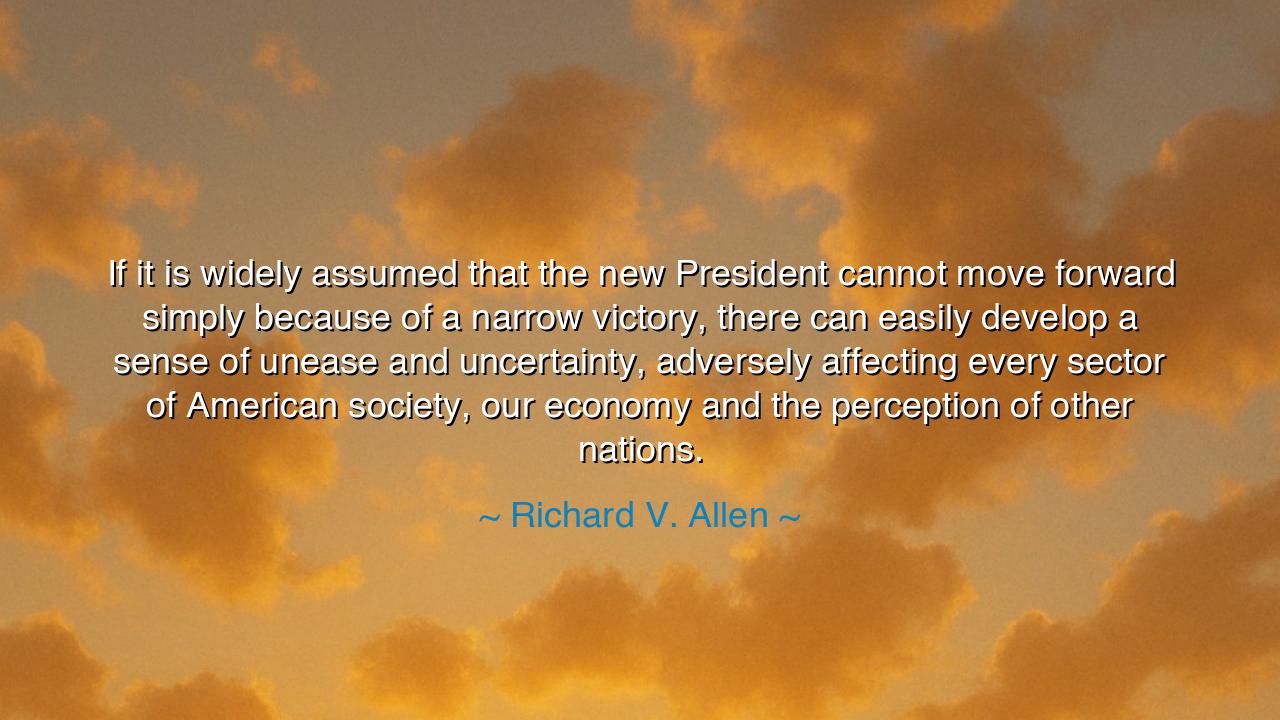
If it is widely assumed that the new President cannot move
If it is widely assumed that the new President cannot move forward simply because of a narrow victory, there can easily develop a sense of unease and uncertainty, adversely affecting every sector of American society, our economy and the perception of other nations.






Richard V. Allen, counselor and voice of statecraft, once warned with prophetic clarity: “If it is widely assumed that the new President cannot move forward simply because of a narrow victory, there can easily develop a sense of unease and uncertainty, adversely affecting every sector of American society, our economy and the perception of other nations.” In these words lies both a caution and a truth eternal: that power is not only won at the ballot, but also in the hearts of the people who either grant legitimacy—or withhold it. For democracy does not live in paper ballots alone, but in the shared belief that the chosen leader, however narrow his triumph, carries the mantle of authority.
This wisdom speaks most clearly when nations stumble upon elections decided by the slimmest of margins. A narrow victory, though lawful, can cast a shadow if doubt lingers and unity falters. The danger is not only in contested votes, but in the spirit of the people who, refusing to rally behind the result, sow discord. From such seeds grow uncertainty, which shakes markets, weakens alliances, and emboldens adversaries who see in division an opportunity to strike. Thus Allen reminds us: legitimacy is as much perception as fact, and its absence corrodes the very foundations of society.
We saw this truth in the contested election of the year 2000, when George W. Bush and Al Gore fought over Florida’s count. Weeks of legal battles and recounts plunged America into a season of doubt. Markets trembled, foreign observers whispered of weakness, and citizens quarreled bitterly over stolen votes. When at last the Supreme Court ended the struggle, the nation bore scars of mistrust. Yet imagine if the quarrel had been allowed to fester longer—uncertainty would have crippled governance, and America’s rivals might have moved boldly against her interests. The episode proves Allen’s words: a President who cannot move forward drags the whole nation backward.
History beyond America offers the same warning. In ancient Athens, when election oracles or jury votes ended narrowly, factions sometimes refused to accept the result. The city would fall into strife, her people divided, and foreign enemies would circle like wolves. Unity behind leadership, even when imperfect, was the shield that preserved the city’s strength. Without it, democracy collapsed into factionalism, and factionalism opened the gates to tyranny.
Allen’s teaching, then, is not a plea for blind obedience but for the recognition that the health of democracy lies in its acceptance. A leader chosen by the people must be given space to govern, lest the whole realm suffer paralysis. To undermine him not with honest opposition but with endless suspicion is to weaken not him alone, but the fabric of the economy, the trust of allies, and the reputation of the nation itself. For other lands look to see whether America can govern itself—and when they see only quarrel, they doubt her might.
For us, the lesson is clear. We must learn to balance vigilance with unity. Question leaders, yes, for accountability is the lifeblood of freedom. But once the choice is lawfully made, we must resist the temptation to let bitterness fester into destruction. A narrow margin does not mean weak authority; it means the leader must work harder to earn trust, and the people must work harder to maintain the republic. The burden is shared, for liberty is sustained not by rulers alone but by citizens who uphold its institutions.
Practical action lies before each of us. When elections end closely, resist the urge to call the winner illegitimate without cause. Encourage your neighbors to engage constructively, not destructively. Support the institutions—courts, legislatures, presses—that clarify truth and maintain stability. And above all, remember that your quarrels at home ripple outward: to investors, to allies, to rivals who watch with unblinking eyes.
So let Allen’s warning be carved into memory: a nation divided against itself over the question of legitimacy invites weakness, chaos, and decay. But a nation that accepts its chosen leader, however slim the margin, preserves its strength. May we learn this lesson well, and pass it on: that unity after decision is the shield of the people, and that without it, even the mightiest republic trembles before the winds of history.






AAdministratorAdministrator
Welcome, honored guests. Please leave a comment, we will respond soon